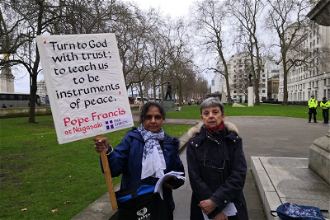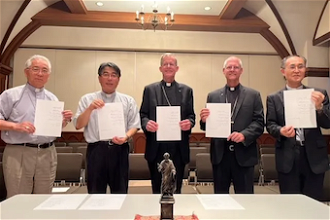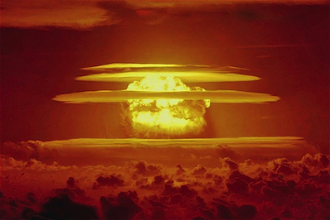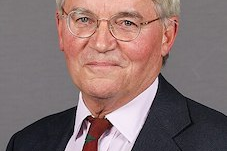Westminster J&P Commission statement on renewal of Trident

As Labour attempt to resolve their defence policy in relation to nuclear weapons, we look at the arguments for and against retaining the UK Trident system in the light of our Faith, and call for an unequivocal refusal to renew Trident, this costly and deadly weapons system.
Pope Francis called for an end to nuclear weapons in October last year, saying: "There is an urgent need to work for a world free from nuclear weapons, in full application of the Non-Proliferation Treaty in letter and spirit with a goal of a complete prohibition of these weapons."
How is this to be achieved? There are vital questions of security, economics and the very purpose of nuclear weapons to be considered.
How did it start? Some remember the devastating destruction caused by the bombs dropped on Hiroshima and Nagasaki and were horrified to read and see, soon after, pictures of a bomb that could vaporise human flesh for a half mile radius and burn thousands of men, women and children, who were miles away from the epicentre. Perhaps we were made aware of the horrors through the Campaign for Nuclear Disarmament founded in the 1950s, and Ban the Bomb marches to Aldermaston, which went on for decades. Yet, not only do the tragic consequences continue 70 years later, but there are now 9 countries in possession of nuclear weapons, some not even signed up to nuclear armaments limitation treaties (Israel denied it had them) - hardly a sign that the issue has 'gone off the boil'.
The UK's nuclear capacity today
"The UK's nuclear deterrent force currently consists of an operational system known as Trident: four Vanguard-class submarines each capable of carrying up to 1611 D-5 ballistic nuclear missiles. At least one submarine constantly is on patrol, while one undergoes maintenance; and the other two carry out manoeuvres" Wikipedia
This is operated by the Royal Navy and based at Clyde Naval Base on Scotland's West Coast - Faslane and Coulport are the two key locations. Each of the submarines can be armed with eight missiles and 40 warheads: so a total of 160 warheads. Frighteningly, each of the 160 warheads has eight times the explosive power of the bomb that destroyed the Japanese city of Hiroshima in 1945. It is very hard to contemplate the capability of destroying over 1,200 Hiroshimas! It is estimated that 75,000 people died in that blast; another 140,000 died some days/weeks later. The death toll reached 200,000 by the end of 1950. There are still health problems for the people of Hiroshima today.
The Modern Potential of Nuclear Weapons
Most of us have no idea of the tragedy, suffering and devastation caused by a nuclear bomb; Trident replacement is discussed like a play-station game. The consequences of using these weapons would far outstrip those of the World War II bombs. One image of the stupidity and insanity of even a single warhead, for instance, is, two men in a large tank of petrol up to their shoulders; one has a lighter which he is threatening to strike to destroy his enemy! The fact is, both will be incinerated by the strike!
The arguments
1 Deter or Use Politicians frequently argue that atomic weapons are a deterrent never to be used. But this had been argued right up to when politicians and generals had them dropped on Japan in 1945, almost as soon as they were available. Ever since, there have been plans for nuclear wars. US bombers planned for and practised small and large scale nuclear bombing runs against North Korea with live nuclear bombs in the early 1950s.
President Eisenhower also threatened China with nuclear bombs, saying: "I see no reason why they shouldn't be used just exactly as you would use a bullet or anything else". The threat of a nuclear war between the US and Soviet Union escalated in the 1960s. The Soviet Union put medium range nuclear missiles on Cuba, from where they could reach the US West Coast within minutes.
The US had placed similar missiles in Turkey. Fear spread across the globe as it became clear that a false alarm could trigger a missile attack. Generals now discussed a "first strike" policy. Rather than risk missiles being destroyed before hitting their targets, they prepared to hit first and discussed ways to "win" a nuclear war. To these ends, the US first put nuclear bomber planes on permanent flight. By the 1980s, following a near-disastrous crash, both NATO and the Eastern Bloc began siting short range missiles across Europe. US President Ronald Regan even talked of a "limited nuclear war" in Germany. After the fall of the Soviet Union these dangers began to feel like ancient history.
Current tensions But tensions between superpowers are rising again. NATO ally Turkey shot down a Russian jet bombing Syria last November. There are regular standoffs between the US, its allies and China over control of the South China Sea. The only way to make sure nuclear bombs are never fired is surely to get rid of them. The danger is exacerbated by the number of countries which possess nuclear weapons and yet are not signed up to nuclear armaments limitation treaties. Israel denied it even had them - it took Mordechai Vanunu to expose them. He served 18 years in an Israeli jail and was released in 2004. He is still victimised for the stand he took.
2 Shield or Target? Supporters of Trident and nuclear weapons generally try to convince us that having atomic weapons will keep us safe and deter wars. Britain has had nuclear armed submarines on patrol since the 1960s. Yet, they did not deter war, conflict or terrorists. ISIS gunmen or any other terrorist will not be prevented from launching an attack on Britain because the state has nuclear weapons. The many attacks or atrocities or suicide bombers and so on, in recent years, have not been resolved by possessing nuclear weapons.
3 Job losses or new opportunities? In the nuclear debate, the idea of job losses is thrown in as a final salvo. Surely £160 billion could be put to better use - to save lives; to fight diseases; to educate our young people, to develop renewable energy.
Spend on Peace, not War If some of the hundreds of billions of pounds due to be spent on quickly out-of-date nuclear weapons, were directed, along with humanity's energy, skills, wisdom, cash, and peace negotiating abilities, towards work for peace, then we might succeed. Yesterday's enemies can become today's friends. Many peace workers, such as Mordechai Vanunu, have struggled and suffered to rid the world of these weapons of mass destruction. We should not let their stand be in vain.
A Will for Peace As individuals, groups and nations, we need a new 'way of thinking' about how nations should relate to one another. We endorse the Pax Christi vision on nuclear weapons:
'Integrity will bring peace, justice give everlasting security' (Is 32:17)
The peace we seek cannot come from weaponry, but from a commitment to justice and nonviolent actions which recognise the dignity of every human person and all creation. We reject models of security that rely on fear, the demonisation of others or on the strength of arms - conventional and nuclear.
We need to support and listen to those who have been on the Peace Trail for years and years. We need to believe that international peace is possible. We need work for peace and to dialogue with our so-called enemies. We need to scrap Trident.
It is ridiculous to make efforts to save our planet on the one hand, and to build up nuclear weapon systems on the other. Our world is too small and precious to have it destroyed.
Westminster Commission for Justice and Peace
February 2016





















